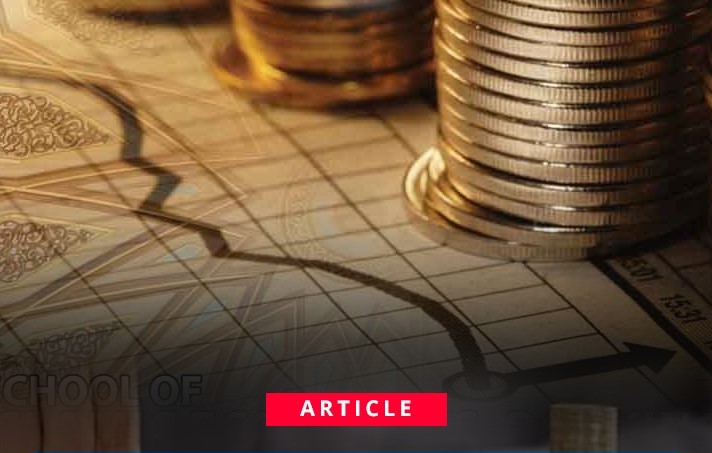Objectives
This essay seeks to:
1. Analyze Pakistan’s current macro-economic situation
2. Asses the proposed “reform” plan of capitalist neocolonial government
3. Present an outline of an Islamic revolutionary alternative to capitalist macro-management strategies
The Macro-Economic Situation
Pakistan’s macroeconomic structure is dualistic. There is a large self-sustaining domestic sector with weak links to global capitalism ineffectively subordinated to the national capitalist state. It amounts to between 40 to 50 percent of gross national value (estimates vary) on an annual basis. A large proportion of this semi-integrated sector is undocumented/informal but it also contains all those businesses and economic activities which are focused on servicing domestic demand. This sector is relatively insulated from the deepening global capitalist recession.
The formal economy (consisting of government, defense, the financial network and large scale manufacturing) is intensely subordinated to global capitalist states and markets. It is this formal sector (and not the semi-capitalist sector) which is engulfed in crisis.
The crisis of the capitalist sector is a crisis of indebtedness – especially foreign indebtedness. The official (SBP) reserves have effectively fallen to zero as they consist entirely of loans from China and the remainder from global multinational and private banks. Pakistan’s Euro bonds are currently trading at less than one third of face value with an average coupon rate of about 17 percent – and still very low demand. Both Moody’s and Fitch have downgraded. Pakistan’s rating and foreign portfolio investment is negative. In fiscal year 2023 Pakistan needs about $12 billion to meet debt servicing charges and other foreign obligations.
Mr. Dar is seeking a costly rescheduling of non-Paris Club debt ($27 billion) and has repeatedly ruled out the possibility of default or of seeking reduction to the debt outstanding (hair cutting).
Pakistan’s external debt is about $133 billion about 76% of current GDP. The Rupee has suffered accelerated depreciation since 2019 when the ongoing IMF-ESAF program came into effect and the Rupee was subjugated to global money markets pressure. Imran Khan’s government de-nationalized the SBP in 2018 and handed over its control to global money markets and the IMF.
The first macroeconomic agreement was signed with the IMF by Ayub Khan’s government in 1958. From the period 1958 to 2023 there have been 22 such agreements. The IMF agreements have depressed growth, stifled investment, fueled structural economic deformities and catastrophically increased both domestic and foreign indebtedness of the government (and of the private capitalist sector).
The Capitalist Response
All governments since independence have been capitalist governments. All governments have been imperialist camp followers. Over time the dependence of the domestic capitalist sector (government, financial institutions, large scale manufacturing) has increased. That is why there is a continuity in the economic perspective of the incumbent regime (Imran Khan’s government (and the People’s Party and Muslim League regimes of 2008-2018). This subservience to imperialism means that both PDM and the PTI remain committed to maintaining Pakistan’s existing subservience to global capitalism. This commitment to imperialism is shared by the establishment – since the military remains heavily dependent on foreign arms procurement and logistic support.
The Pakistani state is a postcolonial state with the dominant elite entrenched in the institutional loci of power erected by the British Empire. The state institution – the bureaucracy, the judiciary, the corporate sector, finance, the media, the legislature – remain moulded along colonial lines and all the obstacles to national capitalist development created by imperialism remain in place.
Hence the alienation – and inefficient integration – of the semi-capitalist economy with the formal sector and the restraint on factor productivity growth. Total factor productivity has stagnated since the late 1980s and stabilization of the economy in present circumstances can only take place at a low (near zero per capita) growth level.
Given the institutional stasis no capitalist regime – PPP, PML or PTI – can afford to craft a national self-reliant, high growth strategy. All capitalist regimes – PPP, PML, PTI – must go begging bowl in hand to imperialist governments and markets. Hence the IMF insists on low growth “stabilization” – the stabilization of the graveyard. Hence Hafiz Shaikh, Shaukat Tareen, Miftah Ismail, Ishaq Dar – see salvation solely in obtaining imperialist financial and political support.
Currently Mr. Dar is seeking rescheduling – as Musharraf did in 2002 following his betrayal of the Afghan Jihad – from China, Saudi Arabia, UAE, the IMF and other imperialist agencies. He regards debt default to be an unmitigated catastrophe. He does not even seek a “haircut” – i.e. a reduction in the total debt payment obligation.
Debt rescheduling has always meant an increase in the debt payment obligations of the client countries. This has been the experience of Mexico, Argentina, Greece, Egypt, Tunisia, the Soviet Union and all other countries that have negotiated debt rescheduling agreements with imperialist governments and markets.
Current estimates show that if the China debt to Pakistan is rescheduled for a 10 year period, debt payment obligation to that country will go up by at least 36 percent (without any further net addition to existing debt).
Capitalist neocolonial regimes whether of the PPP, PML or PTI will not only seek debt rescheduling, they will continue to borrow from commercial banks and bond and Sukuk markets. The funds so obtained will be absorbed primarily in debt servicing and in enhanced corruption. They will not be used for promoting factor productivity growth since neocolonial government in Pakistan will remain committed to maintaining the institutional and sector stasis that has existed in the country during the colonial and /neocolonial era (roughly 1799 to date).
The Islamic Alternative
I now take up the hypothetical question of what an Islamic revolutionary government may do in the unlikely event that it comes to power in 2023.
1. Immediately default on all official and commercial debt payments will be suspended and negotiations with all creditors for debt reduction and cancellation will be instituted. We would immediately and irrevocably cancel all interest payment obligations (as they are considered haram by both Islam and Christianity). Payment of principal amount due will be related to export and remittance receipts (say 10 percent of export and receipts which each year will be allocated to payment of principal debt outstanding).
2. We do not anticipate any serious impact on the economy of default. Receipt of foreign capital markets and multinational sources will be suspended but since these inflows are used mainly for debt servicing their termination will have no serious effects on the overall investment level. Foreign portfolio investment has been negative or negligible for several years and net FDI flow has been a trivial component of gross capital formation. We do not expect a termination of direct investment under the CPEC program. No country which has suspended debt payments in the past – Argentina, Sri Lanka, Lebanon and Ecuador etc. – has suffered an exclusion from export markets or been subjected to sanctions. We do not expect any negative impacts on our exports due to debt default. It is also unlikely that sanctions will be imposed consequent to default. Sanctions are usually imposed for political – not for economic – reasons. Pakistani debt is a miniscule proportion of global debt outstanding and its’ payment of its suspension will have no visible impact on global finances. Sanctions may be imposed to punish Pakistan for installing an Islamic regime but sanctions will have no serious impact on our economy. Sanctions were imposed in 1998-99 in response to our nuclear explosion and all international capital inflows were suspended but the economy grew by 5 percent that year. CPI inflation was about 3 percent and gross domestic capital formation was positive.
3. An Islamic revolutionary government will severe all links with global capital markets since global financial transactions are all riba and gharar based. It will institute a managed fixed exchange rate regime. We will not contract any foreign loans (in the form of bonds, sukuk or commercial or multinational source borrowings). We will impose strict capital controls on both current and financial accounts of the balance of payments and institute a system of foreign exchange and import licensing. All foreign exchange inflows and outflows will be channeled through the government.
4. We will immediately nationalize banks (including Islamic banks) and financial institutions, abolish the money and capital markets and gradually substitute for the Pakistani rupee a new currency called the Islamic Dinar. The issuance and distribution of the Islamic Dinar will be linked not to foreign exchange reserves but to national physical production requirements and demand. We will institute currency and credit planning.
5. Our main concern will be the enhancement of factor productivity. We will promote investment in the capital goods industries (defense production, ITC, heavy machinery, electrical, steel). These industries will be nationalized.
6. We will abolish the zameendari system and confiscate all harbi lands without compensation and distribute them among the harees and mazaras. We will institute usher on agricultural capital and production.
7. We will promote self-employment and integrate the formal and informal sectors of the economy. Economic policy will be domestic demand – and not export-driven and will seek to promote import substitution, especially in the food, pharmaceutical, capital equipment, ITC, and service sectors. We will ban the export of professional capital (doctors, engineers, management professionals, ITC workers from the country).
This is something of a wish list as the possibility of an Islamic revolutionary regime coming into power in 2023 are nil. Nevertheless, it is important that Islamic party representatives (30 to 35 such can be elected provided there is electoral unity among the main Islamic parties in 2023) adopt a revolutionary stance in the national assembly and from the opposition benches criticize the macroeconomic strategy of the neo-colonial capitalist government from an Islamic revolutionary perspective.
In the present circumstances, it is particularly important that our representatives in parliament continuously and consistently present a case for immediately instituting a planned default, a halt to all borrowings from multilateral, bilateral, and commercial market sources, and the rejection of a new IMF “stabilization” program. We must endeavor to show that such a move undermines genuine stabilization of the macroeconomy and that the stabilization that the IMF seeks to impose on Pakistan is a stabilization of the graveyard.
Authors:
Dr.Muhammad Tahir
Muhammad Youns Qadri
Dear TNT Reader,
At The News Tribe, our mission is to bring you free, independent, and unbiased news and content that keeps you informed and empowered. We are committed to upholding the highest standards of journalism, as we understand that we are a platform for truth.
Apart from independent global news coverage, we also commit our unique focus on the Muslim world. In an age marked by the troubling rise of Islamophobia and widespread misrepresentation of Muslims in Western media, we strive to provide accurate and fair coverage.
But to continue doing so, we need your support. Even a small donation of 1$ can make a big difference. Your contribution will help us maintain the quality of our news and counteract the negative narratives that are so prevalent.
Please consider donating today to ensure we can keep delivering the news that matters. Together, we can make a positive impact on the world, and work towards a more inclusive, informed global society.
Donate Monthly Subscription Annual Subscription





